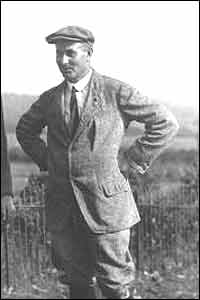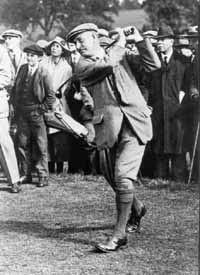 In the minds of many Americans, golf celebrity was realized in Arnold Palmer. He was the people’s champion. He could hit the ball a mile, had a quirky follow through, and putted knock-kneed, which was fun to watch. Then along came Jack. He stole the show and set an almost unattainable standard for success in the golfing world. Tiger showed up a few years back and began to redefine the title “best golfer ever” yet again. He’s probably already done but we’ll still wait until he beats Jack’s record.
In the minds of many Americans, golf celebrity was realized in Arnold Palmer. He was the people’s champion. He could hit the ball a mile, had a quirky follow through, and putted knock-kneed, which was fun to watch. Then along came Jack. He stole the show and set an almost unattainable standard for success in the golfing world. Tiger showed up a few years back and began to redefine the title “best golfer ever” yet again. He’s probably already done but we’ll still wait until he beats Jack’s record.
Long before any of them there was a quiet man who redefined the word “champion.” He was a lowly greens keeper who became the first international celebrity in golf: Harry Vardon. Here is a snippet of his fascinating life…
What did this man accomplish that carved his image indelibly upon the history of golf?
Vardon didn’t become a professional until he was twenty years old. While modern golf superstars begin to hone their swings shortly after hopping out of the cradle, Vardon didn’t take up the game until his teens. His earliest exposure to golf was caddying for a gentleman who had hired him to take care of his garden. In addition to his gardening duties Vardon caddied for him and on occasion Vardon was given the opportunity to play. He obviously took to it.

Vardon was born May 9, 1870, in Grouville, on the Isle of Jersey. Jersey was among the Channel Islands between England and France. He had five brothers and two sisters. He idolized his older brother Tom, a golf professional. Had it not been for Tom’s example he may have followed his father uninterrupted into a gardening career.
He had played a similar game to golf in his childhood, one played with small wooden clubs and a marble around an extremely short course. It is well known that he was accurate and long for his time. His precise ball striking and shallow divot can probably be attributed in part to that simple child’s game.
At only 5′ 9″ and 155 pounds, he quickly became a dominating player. Bernard Darwin once said of Vardon, “I do not think anyone who saw him play in his prime will disagree as to this, that a greater genius is inconceivable.” He played with a more upright swing than his contemporaries which enabled him to hit the ball further. His shallow divots and high ball flight gave him an extra edge with longer irons or fairway woods in his hand. Sounds like the advantage some enjoy today. It seems the game was always changing, always evolving.
Unfortunately for Vardon he was stricken with tuberculosis after his 1903 victory at the Open and was unable to play until 1910. He was never the same player but, as a testament to his tenacity, he went on to add two more Open Championship to his resumé in 1911 and 1914.
 By the time Harry Vardon came to America in 1900 to play in the U.S. Open and in exhibition matches he had secured his place as one of the all-time greats. On this early trip to America he was sponsored by the Spalding sports company to endorse a new ball, the Vardon Flyer. He was well regarded by the Americans and did much to endear the game to the Americans. He hit balls into a backstop at various locations in the States in his effort to spread the game and represent Spalding.
By the time Harry Vardon came to America in 1900 to play in the U.S. Open and in exhibition matches he had secured his place as one of the all-time greats. On this early trip to America he was sponsored by the Spalding sports company to endorse a new ball, the Vardon Flyer. He was well regarded by the Americans and did much to endear the game to the Americans. He hit balls into a backstop at various locations in the States in his effort to spread the game and represent Spalding.
When his career was complete he had won a record six Open Championships (1896, 1898, 1899, 1903, 1911, and 1914) and one U.S. Open (1900). Had he played the kind of schedule that modern players enjoy he likely would have accomplished much more. But like pioneers in every arena he set a precedent for greatness that others would have to follow. His six British Open titles is still a record.
His pithy commentary may rank him as the first golf psychologist. He once said, “To play well you must feel tranquil and at peace. I have never been troubled by nerves in golf because I felt I had nothing to lose and everything to gain.” He also said, “Relaxation added to a few necessary fundamental principles, is the basis of this great game.” Many of us who play today would benefit from employing his cool attitude at all times.
It almost goes without saying that he popularized the overlapping grip that bears his name. His solid and stable grip is copied by almost everyone in the world not called Jack Nicklaus or Tiger Woods. Vardon’s large hands suited the grip well.
His accomplishments are impressive in light of what he overcame. He is remembered every year on the American and European PGA Tours when the scoring title is given out as the Vardon Trophy bears his name. We are the beneficiaries of his success and popularity on both sides of the pond. Vardon is the grandfather of modern golf.
Photo Credits: © bbc.co.uk, © South Herts GC.

Thank you for this succinct, but informative view of a legendary golfer. I think its important not only to remember, but also to study our antecedents. After all, its really nice to know a fellow about my size won six Open Championships! Well done.
Nice mini-bio, Jeff. While a lot of people like to compare golfers across generations – is Tiger better than Jack? – I think the only true measure is to ask “was he the best of his time?” Obviously, Vardon was.
“was he the best of his time?” I think that is precisely the right question, Tartanjack.
Vardon was clearly the most dominant player of his era. 6 Open Championships is an unsurpassed accomplishment.
Shortgame85, you bring up an important point. Each era in golf can be celebrated and appreciated for what it is. Vardon’s story is inspiring. He was definitely a pioneer.
Thanks for the input. 🙂
I recall from other readings on Vardon that he had a bent left arm and split-handed palm grip for most of his career. Theodore P. Jorgensen mentions the former in his book, “The Physics of Golf”, chapter 10.
Thanks for the article.
I am lucky enough to live in Jersey (still one of the Channel Islands by the way ! =) ) and have played plenty of times at the Royal Jersey Golf Club at Grouville.
When playing the 12th hole a little diversion to the right of the fairway a stone lies ;
http://www.top100golfcourses.co.uk/htmlsite/productdetails.asp?id=305
I would definitely include the Grouville Links on anyone’s golf course “collector’s list”.
What a great man he was ; more insight and respect to be had by reading and watching “The Greatest Game Ever Played.”
I can’t imagine many modern golfers coughing up blood between rounds (in those days the Open was played 36 holes on each of the two days) and still winning.
But for the tuberculosis and the Great War who knows how many Opens he could have won ?
I desperately hope that Tiger doesn’t beat his record, but he can win the US Majors as many times as he likes ! =)